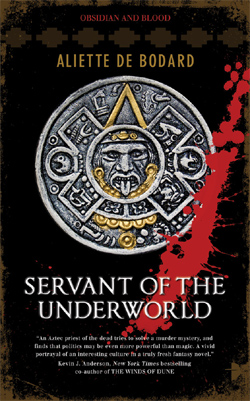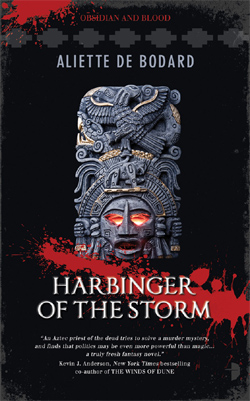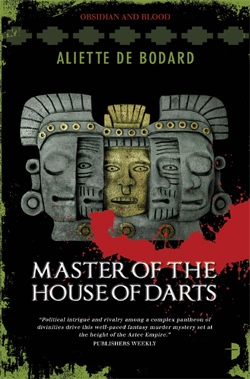This is the seventh interview and the ninth post in my series on inclusivity and exclusivity in fiction. You can find a full list of other posts so far in the series at the end of this piece.
In today’s post, I talk with British Science Fiction Association award-winning French/Vietnamese writer Aliette de Bodard about writing, reading, cultural divides, and the bridges that span them.
 LUC: Just to bring your work to science fiction and fantasy readers in North America, you’ve had to bridge a number of gaps–ethnic, linguistic, geographical, and more. Does this affect how you choose your characters and how you think about writing?
LUC: Just to bring your work to science fiction and fantasy readers in North America, you’ve had to bridge a number of gaps–ethnic, linguistic, geographical, and more. Does this affect how you choose your characters and how you think about writing?
ALIETTE: I have to admit that I didn’t quite think of it that way! For starters, I was hardly aware of the SFF market as being sharply compartimentalised when I started writing–and, if anything, I would have targeted my work at the UK market, since that’s where I started reading most of my genre. I also seldom think in terms of gaps when writing: rather, I write passionately about things that matter to me, and trust that this enthusiasm will communicate itself to the reader.
But yes, if we’re talking quite plainly–of course my origins, my personality and the milieu I grew up in and am still part of deeply and irrevocably approach how I’m choosing characters and how I think about writing. I would be a very different person if I had grown up white on the US East Coast–my family, my education, my friends, etc. have shaped me as a writer, and continue to shape me.
I tend to pick characters from non-mainstream backgrounds, mainly because I’m somewhat disquieted by how SF, which should be the literature of the mind-blowing and mind-opening, tends to over-feature characters from a certain background (overwhelmingly male, white and American or Western Anglophone) and from a certain mindset (what I would call “tech-loving” with a strong faith that science will make things better). Not, of course, that I have anything against those views myself, but the over-representation of these can be a little overwhelming in the bad sense of the term…
I approach writing as the sum of everything that I have read, which means traditional French/English/Vietnamese/Chinese literature as well as genre from Ursula Le Guin to Alastair Reynolds to Jean-Claude Dunyach. Reading so much in so many traditions has enabled me to see that the “rules” of writing (like “show don’t tell”) are deeply problematic because they enforce the conformity of a certain type of fiction–they’re a great help as you’re starting out, but taken too rigidly they can easily lead people to stifle their own creativity in the search of the technically perfect, but soulless story.
It’s hard for me to tell how much my approach to writing is shaped by my background and which specific bits are “different”–I know that I place a high importance on family in my fiction, and immigration and living between different cultures (obviously a very personal preoccupation!), but I assume there are more subtle effects on themes, characters and storylines that I’m not able to see because I’m too close to them.
 LUC: There are a lot of interesting threads in that response, but let me grab onto one particular one, because I don’t think it’s ever even come up in this discussion for me until now: science fiction tending to include people of a certain mindset. I had never thought of it that way before, but it strikes me immediately as having a lot of truth to it. When science fiction stories emphasize strongly tech- and science-friendly characters, what points of view would you say aren’t getting a lot of representation?
LUC: There are a lot of interesting threads in that response, but let me grab onto one particular one, because I don’t think it’s ever even come up in this discussion for me until now: science fiction tending to include people of a certain mindset. I had never thought of it that way before, but it strikes me immediately as having a lot of truth to it. When science fiction stories emphasize strongly tech- and science-friendly characters, what points of view would you say aren’t getting a lot of representation?
ALIETTE: Hum, it’s one of those questions where I don’t think I can give a complete answer to, but I can provide a few examples… By and large, SF is mainstream US, 21st-Century and tech-loving, which means that anything outside those points of view is getting poor representation. I can mention a few things that struck me, beyond the most obvious ones of poor POC/female/non-US representation, but this is obviously very limited!
- the paucity of stories where family is important, and in particular family outside the nuclear family (SF sometimes gets around to mentioning fathers and mothers, but aunts, uncles and cousins somehow seem beyond the realm of possible relationships)
- a marked dichotomy between allegiance to a church or allegiance to science, generally failing to recognise either that the two points of view are not incompatible, or that religion doesn’t necessarily mean full allegiance to a church (in many Asian countries, people practise bits and pieces of religions depending on the circumstances, and don’t refer to a single church for prescriptions on every aspect of their daily lives)
- a presentation of individualistic, lone mavericks who strike out to seek adventures as intensely heroic, and a deriding of people who do not follow that mindset as being cowardly (in Asian culture, people who abandon their families to strike out would be the cowards because they shirk their duties to provide for their relatives, and the act of falling out with your own family would be a tragedy rather than a cause for celebration).
LUC: Recently on your Web site, you quoted Juliana Qian:
Our cultures are exotic, fashionable, fascinating and valuable when contained within or filtered through a white Western lens – then our cultures are glittering mines. But drawing from your own background is backward and predictable if you’re a person of colour. Sometimes white people try to sell me back my culture and I have to buy it. My China is as much the BBC version as it is the PRC one. There are things I want to eat but cannot cook.
This brings up the question of how different it is for someone within a group–whether we’re talking about, for example, Russians, transgendered people, or people with physical handicaps–to write about that group than for someone outside in terms of how the writing itself is viewed. How does this affect your work, or the work of other writers whose work you follow?

ALIETTE: It’s all but inevitable that someone within a group will perceive it in different terms than someone outside a group: it’s what I call “insider” writing vs “outsider” writer. There are two different problems: who is writing this, and for whom it is intended. I’ll leave aside the obvious combinations of outsider writer for outsiders only (which is a very dodgy proposition and fairly exclusionary) and insider writer for insiders only (posing no particular issue: write what you know for people who know it as well). That leaves the “crossing overs,” i.e., outsider writers writing for an audience which includes insiders and insider writers writing for an audience which includes outsiders.
If you’re an outsider, it is possible to achieve a sufficient degree of empathy with the group to make your depiction of it from the inside plausible, but it takes a lot of hard work, and I think people don’t understand how seldom this happens: the authors who pull this off, say, for Vietnamese culture, can literally be counted on the fingers of one hand, and generally have thoroughly immersed themselves into it for years. A few more authors will produce a passable description, and the bulk will unfortunately perpetuate majority stereotypes or latch onto what seems to them shiny elements of a culture–elements that are totally natural to insiders (one of my favourite examples from Sino-Vietnamese culture includes the over-emphasis on face, which is an unconscious thing–people don’t spend their time going, “oh, I’m going to lose face if I do this” every two lines!). Hence the importance of thinking very carefully about what you’re doing when depicting a culture and of getting beta-readers from said culture to correct you.
If you’re an insider, you have a slightly more difficult problem. I’ve already said that the elements of a culture that appeal to outsiders are not necessarily the ones that insiders think most important, and also that many things that seem natural to you (like food) will require explanation in order to make sense to outsiders. There’s a hard line to draw between making your culture a little more “accessible” to outsiders, and between twisting it out of shape so it appeals to the market.
In my work, I’ve done outsider and insider depiction: when I do outsider (such as in the Aztec books), I do my best not to exoticise or demonise practises that the main characters would have found totally natural, like human sacrifices. When I do insider writing, I find myself very often having to explain behaviours and attitudes that are perfectly normal to me, but that make no sense to outsiders (like filial piety or Confucianism): the first draft of my novella “On a Red Station, Drifting” basically had every (non-Vietnamese) reader terminally confused, and I had to do my best to clarify what I meant without having the impression that I was putting the “crunchiest bits” of my culture on display for Westerners (I enjoy writing about my background, but I certainly don’t want the feeling that I’m debasing it in order to sell better!).
LUC: I was interested when you mentioned those authors that you could count on the fingers of one hand, because while we’ve all seen examples of mishandling of other cultures, examples of people who do the job really well seem harder to come by. Are there any writers that come to mind to you offhand who really do an exceptional job, whether they’re outsiders whose writing rings true to insiders or insiders who make a real connection with outsiders?
ALIETTE: It’s going to be hard for me to point out outsiders who really do insider narrative well, as I can’t really appreciate anything beyond France and Vietnam in fiction; and a lot of portrayals of both, as I said above, are very debatable to say the least. That said, one of the works I thought did a great job of evoking the spirit of 17th-18th Century France was Kari Sperring’s debut, Living with Ghosts: the intricate plot and delicately-drawn characters made me think of a modern-day, more nuanced Dumas.
There are more than a few people who are insiders and who create a real connection with outsiders: the first one who comes to mind is the unstoppable Ken Liu, whose fiction is basically everywhere, and who creates really strong stories driven by Chinese culture. I can also cite Rochita Loenen-Ruiz, whose idiosyncratic Filipino SF is bound to make a huge splash (check out her “Alternate Girl’s Expatriate Life“, which tackles emigration, mixed marriages and power dynamics in a very spec-fic way), and Zen Cho, who has a knack for mixing comedy and poignancy in really well-realised stories (her “House of Aunts” is a really awesome not-quite-our-vampires story).
As far as novels go, can I point out to Thanh Ha Lai’s truly awesome “Inside Out and Back Again”, which shows emigrating to America from the point of view of a young Vietnamese girl and the resultant culture shock; and to Joyce Chng’s Wolf at the Door and sequels, urban fantasy set in a vibrant and rich Singapore and featuring a very strong main character in the presence of werewolf pack leader Jan Xu.
 Aliette de Bodard
Aliette de Bodard lives in a flat with more computers than warm bodies, and writes speculative fiction in her spare time–her Aztec noir fantasy trilogy Obsidian and Blood was published by Angry Robot, and her short fiction has garnered her a British Science Fiction Award and nominations for the Hugo, Nebula and Campbell Award for Best New Writer. When not writing, she blogs and posts recipes over at
www.aliettedebodard.com
Like this:
Like Loading...









 Aliette de Bodard lives in a flat with more computers than warm bodies, and writes speculative fiction in her spare time–her Aztec noir fantasy trilogy Obsidian and Blood was published by Angry Robot, and her short fiction has garnered her a British Science Fiction Award and nominations for the Hugo, Nebula and Campbell Award for Best New Writer. When not writing, she blogs and posts recipes over at
Aliette de Bodard lives in a flat with more computers than warm bodies, and writes speculative fiction in her spare time–her Aztec noir fantasy trilogy Obsidian and Blood was published by Angry Robot, and her short fiction has garnered her a British Science Fiction Award and nominations for the Hugo, Nebula and Campbell Award for Best New Writer. When not writing, she blogs and posts recipes over at 
